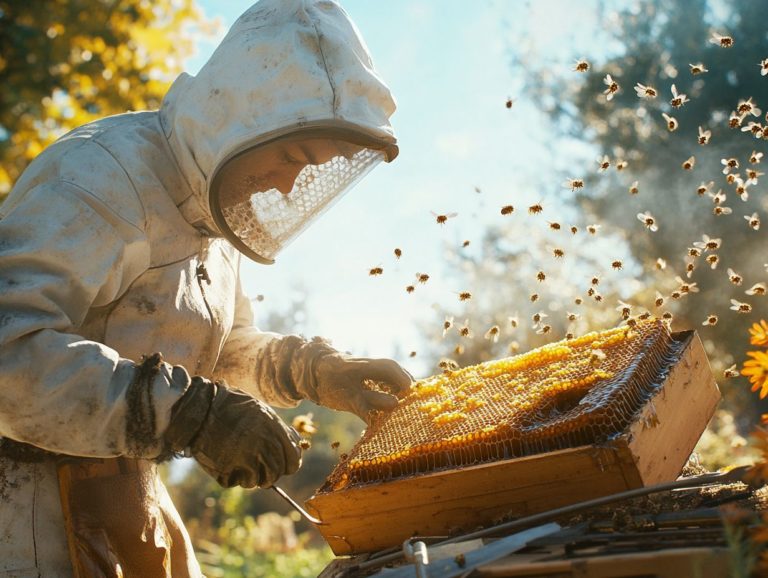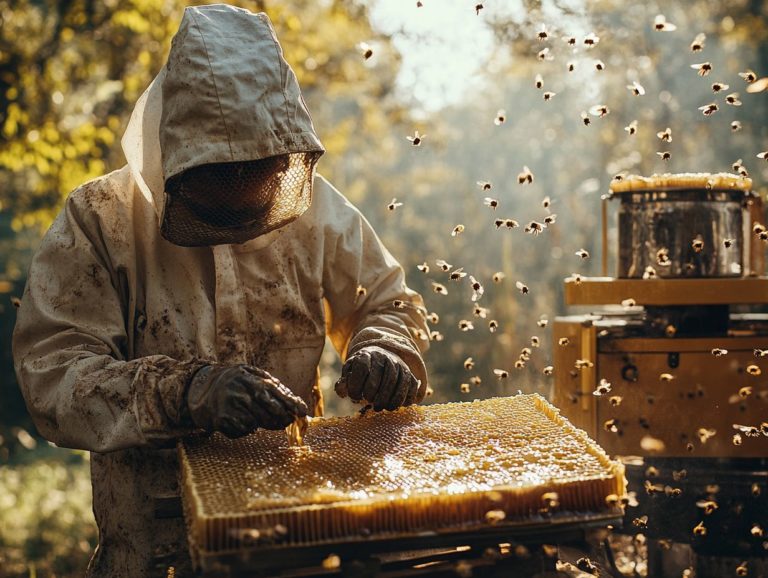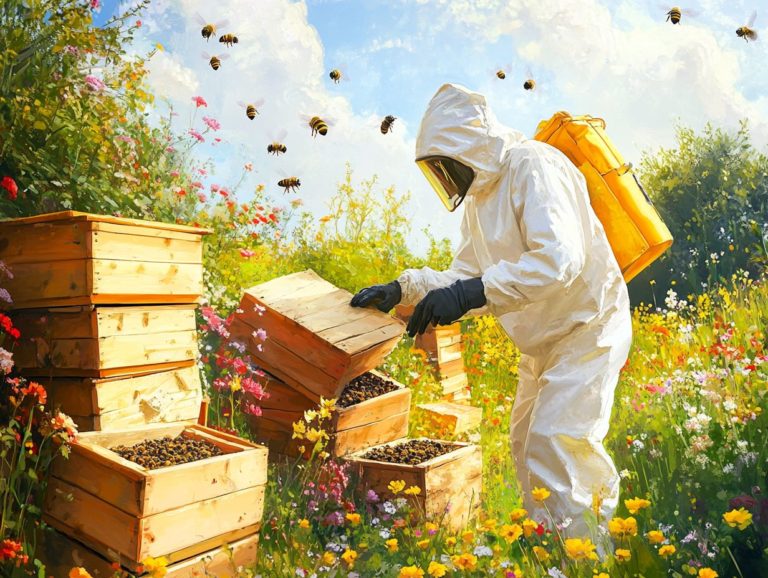The Environmental Benefits of Honey Production
Honey production goes beyond being a delightful treat; it plays a crucial role in our environment and shows how we can act sustainably to address climate change.
Let s dive into how honey is made and why it s essential for our planet! The tireless efforts of bees help pollinate plants and preserve vital habitats honey production is key to fostering a healthier planet.
As a consumer, you can champion eco-friendly honey practices, contributing to a sustainable future while enjoying the health benefits of honey.
Contents
- Key Takeaways:
- What Is Honey Production?
- How Is Honey Produced?
- What Are The Environmental Benefits Of Honey Production?
- 1. Pollination of Plants
- 2. Preservation of Habitats
- 3. Carbon Sequestration
- 4. Support for Local Ecosystems
- What Are The Sustainable Practices In Honey Production?
- 1. Organic Beekeeping
- 2. Use of Natural Pest Control Methods
- 3. Preservation of Native Plant Species
- 4. Responsible Harvesting Techniques
- How Can Consumers Support Sustainable Honey Production?
- 1. Purchase Honey From Local Beekeepers
- 2. Look for Organic and Sustainable Certifications
- 3. Reduce Consumption of Imported Honey
- 4. Educate Others About the Benefits of Sustainable Honey Production
- Frequently Asked Questions
- What are the environmental benefits of honey production?
- How does honey production promote pollination?
- How does honey production help preserve bee populations?
- What are the benefits of supporting biodiversity through honey production?
- How does honey production contribute to sustainable land use?
- What are some other potential environmental benefits of honey production and beekeeping?
Key Takeaways:
- Bees are essential for growing many plants, making honey production vital for a healthy environment.
- Support biodiversity by choosing organic honey and preserving native plants.
- Help sustainable honey production by buying local, organic honey and spreading the word about the environmental benefits of responsible beekeeping.
What Is Honey Production?
Honey production is the art of collecting honey, a delightful natural sweetener made by honey bees from flower nectar. This sustainable activity meets the growing demand for honey while also playing a vital role in environmental education.
It highlights the importance of honey bees, which are crucial for enhancing plant diversity. In this way, honey production represents a harmonious blend of agriculture, ecology, and sustainability, fostering healthy bee populations and nurturing local ecosystems.
How Is Honey Produced?
Honey production starts with beekeeping, where honey bees gather nectar through pollination. This crucial process supports the importance of pollinators.
Monitoring your bee populations is essential to ensure they thrive and produce high-quality honey to meet demand.
When it’s time to harvest, use responsible techniques that minimize the environmental impact, honoring both the bees and the ecosystem.
What Are The Environmental Benefits Of Honey Production?
Act now! Engaging in honey production not only creates delicious honey but also boosts pollination, which promotes plant diversity and nurtures healthier ecosystems. These elements are crucial for advancing the Sustainable Development Goals set by the United Nations.
The methods used in honey production often reduce greenhouse gases, highlighting its role in the fight against climate change while fostering ecological harmony.
1. Pollination of Plants
The pollination of plants by bees plays a crucial role in honey production. It significantly boosts biodiversity and crop yields.
This essential service provided by thriving bee populations ensures the successful reproduction of flowering plants. It also helps maintain balanced local ecosystems, highlighting the vital role bees play in environmental health and food production.
Pollination by these industrious insects is fundamental for the growth of many fruits, vegetables, and nuts. These staples are cornerstones of human diets and critical for agricultural economies worldwide.
As bees transfer pollen from one flower to another, they facilitate fertilization. This process leads to the development of seeds and fruit, directly impacting food production and crop yields.
This process supports various plant species that depend on insect pollinators, fostering biodiversity. However, the decline in bee populations poses a significant risk to agriculture and natural habitats.
2. Preservation of Habitats
Honey production is not just about the sweet rewards; it preserves habitats that support diverse bee populations and wildlife. This ultimately enhances overall biodiversity.
By engaging in sustainable farming practices, you contribute to the health of local ecosystems. This is essential for meeting agricultural demands for crops and honey while helping in wild bee preservation.
Methods like organic farming and creating pollinator-friendly landscapes improve the environment. They also provide vital habitats for various species, including wild bees.
When you prioritize environmental health, you foster a balance that can lead to increased crop yields. This creates healthier food systems, ultimately benefiting consumers.
Protecting natural habitats ensures the intricate web of life including insects, birds, and plants continues to thrive. This nurtures a robust ecosystem that supports agricultural endeavors.
Such synergies illuminate the connection between honey production, ecological preservation, and sustainable agriculture. They showcase the impactful role you play in this vital ecosystem.
3. Carbon Sequestration
Honey production plays an indirect yet significant role in carbon sequestration. It supports diverse ecosystems that effectively absorb carbon dioxide, aiding in reducing greenhouse gases.
By promoting healthy bee populations and sustainable practices, you help create environments that excel at storing carbon. This reduces the overall carbon footprint.
Vibrant ecosystems filled with flowering plants are essential for encouraging robust plant growth. This growth is crucial for trapping atmospheric carbon.
Your involvement in beekeeping fosters biodiversity. These lively landscapes benefit not just honeybees, but also a variety of other pollinators and wildlife.
By adopting eco-friendly methods, you enhance soil quality and promote denser foliage. This leads to increased carbon absorption.
Understanding the role that bees play in these ecosystems shows how their thriving populations can assist in the fight against climate change. This also results in the production of delightful, natural honey.
4. Support for Local Ecosystems
Honey production is essential for supporting local ecosystems, highlighting the critical role pollinators like bees play in maintaining biodiversity and overall environmental health. The interaction between honey production and these ecosystems demonstrates how embracing sustainable agricultural practices can enhance their resilience and support the Sustainable Development Goals.
Nurturing bee populations through thoughtful hive management inadvertently bolsters a broader network of plant and animal life that relies on these vital pollinators. The diverse flowering crops you cultivate for honey attract a variety of insects, enriching the vitality of the surrounding ecosystems and supporting local fauna.
This symbiotic relationship illustrates how agricultural efforts focused on honey production can lead to healthier landscapes, ultimately benefiting both local farmers and the environment. Increased biodiversity contributes to a more stable climate, showcasing the delicate balance between ecological health and agricultural success, as highlighted in studies published in Current Biology.
What Are The Sustainable Practices In Honey Production?
Sustainable practices in honey production are important for ensuring the health and longevity of bee populations, as well as enhancing the quality of the raw honey you enjoy. These practices are important for reducing carbon emissions and promoting biodiversity improvement.
By adopting techniques such as organic beekeeping and natural pest control methods, you can protect bees from harmful chemicals while promoting the preservation of native plant species. These methods contribute to the reduction of greenhouse gas emissions and support wild bee preservation.
This approach safeguards the bees and fosters a balanced ecosystem that benefits everyone. It underscores the importance of pollinators in achieving sustainable food production and environmental health.
1. Organic Beekeeping
Organic beekeeping represents a harmonious and sustainable practice that prioritizes the health of bee populations without resorting to harmful pesticides. By embracing this method, you ensure the production of high-quality honey while contributing to the overall health of the environment, fostering a resilient ecosystem.
This practice supports sustainable development goals, making a real impact on our planet’s health! By emphasizing natural methods, organic beekeeping enhances hive biodiversity, which is essential for effective pollination and robust production of fruits and vegetables.
The guiding principles involve steering clear of synthetic chemicals (man-made substances that can harm the environment) and pesticides, employing natural treatments for pests, and encouraging the bees to exhibit their natural behaviors.
This comprehensive approach yields honey that is not only richer in flavor and nutrients but also free from chemical residues, appealing to the discerning tastes of health-conscious consumers. Healthier bee populations thrive in their natural surroundings. This promotes flowering plants and maintains a balanced ecosystem, which is essential for improving biodiversity.
2. Use of Natural Pest Control Methods
Embracing natural pest control methods in honey production is crucial for maintaining healthy bee populations while minimizing environmental impact. By steering clear of synthetic pesticides, you cultivate a more sustainable practice that supports both your bees and the ecosystem.
This thoughtful approach not only safeguards the delicate balance of local biodiversity but also enhances the health of your hives. Incorporating alternative strategies like introducing beneficial insects, utilizing botanical repellents, and adopting organic farming practices can significantly elevate your pest management efforts without jeopardizing the well-being of your bees.
These methods promote harmony in nature, enabling your pollinators to flourish and fulfill their essential role in food production. By recognizing the interconnectedness of all living organisms, you can take an active role in environmental stewardship, ensuring that your practices benefit not only honey production but also the natural world as a whole. Act now to protect our bees!
3. Preservation of Native Plant Species
The preservation of native plant species is crucial for honey production, as it provides essential forage for pollinators like bees. A diverse range of flowering plants enhances biodiversity and supports ecosystem health.
This variety of flora sustains bees and strengthens ecosystem resilience. As native species bloom, they attract various pollinators, enriching the environment and improving honey quality.
Preserving native plants leads to healthier bee populations. Healthy bees are vital for pollination and benefit both agriculture and wildlife.
In this way, sustaining native flora isn t just a matter of honey production; it s about nurturing the intricate balance that upholds the health of our planet.
4. Responsible Harvesting Techniques
Responsible harvesting techniques are vital for sustainable honey production and the safety of bee populations. By prioritizing bee health and hive integrity, you can harvest honey without harming future yields.
Practices like monitoring hive health and minimizing disruption during collection help nurture a robust ecosystem. These methods enhance bee colony viability and contribute to our agricultural landscape.
In this manner, you secure the long-term viability of both the apiary and the surrounding flora, fostering a balanced relationship that supports food production systems and preserves vital pollinator species.
How Can Consumers Support Sustainable Honey Production?
You can make a meaningful impact on sustainable honey production by choosing honey from local beekeepers. These artisans often use practices that support both the environment and healthy bee populations.
By seeking out organic certifications and making informed purchasing decisions, you can play a crucial role in promoting environmental education and raising awareness about the significance of sustainable practices in honey production. Your choices matter! They can help create a brighter future for bees and ecosystems.
1. Purchase Honey From Local Beekeepers
When you buy honey from local beekeepers, you enjoy high-quality sweetness and support sustainable practices that benefit the environment. This choice helps preserve bee populations and promotes responsible honey production methods.
Buying from local sources cultivates a sense of community and strengthens economic ties within your area. When you support nearby artisans, you help keep that money circulating within the local economy, creating jobs and encouraging biodiversity.
Locally sourced honey often dazzles with superior flavor and natural benefits, reflecting the unique flora of your region. This not only elevates your culinary experience but also allows you to savor raw honey that is free from additives and preservatives. Plus, local beekeepers are usually more transparent about their practices, giving you peace of mind about quality and ethical sourcing.
2. Look for Organic and Sustainable Certifications
Want to make a positive impact? Look for organic and sustainable certifications when buying honey! These certifications help ensure that the products align with environmentally friendly practices.
By choosing certified honey, you support production methods that promote the health of bee populations and ecosystems. These choices minimize the impact of harmful pesticides and chemicals, while encouraging beekeepers to adopt ethical practices that respect both bees and their habitats.
With the rising demand for certified honey, now’s the time to make your choice count! Being aware of organic and sustainable certifications not only benefits your personal health but also plays a crucial role in protecting our planet’s invaluable bee populations.
3. Reduce Consumption of Imported Honey
Reducing your consumption of imported honey is vital for supporting local honey production and minimizing the carbon footprint linked to transportation. When you buy local honey, you re not just enjoying a sweet treat; you re promoting sustainability and supporting local beekeepers.
Choosing locally sourced honey helps preserve regional ecosystems. Local beekeepers are often more attuned to their area’s specific environmental needs. This support nurtures biodiversity by encouraging the pollination of native plants and strengthens the local economy.
By prioritizing local products, you actively participate in a cycle that enriches the environment and sustains agricultural practices. Your commitment to reducing imported honey fosters greater awareness about the importance of bee populations, inspiring more individuals to help preserve these essential pollinators.
4. Educate Others About the Benefits of Sustainable Honey Production
Educating others about the benefits of sustainable honey production is key to fostering community awareness. By sharing insights into the environmental advantages of honey production, you can inspire collective action.
You can use various strategies to engage your community meaningfully. Organizing workshops allows individuals to gain hands-on experience in beekeeping and understand its environmental impacts. Similarly, community outreach programs create opportunities for discussions about the decline of pollinators and their vital role in food production.
Leveraging social media platforms opens up an interactive space for sharing information. Telling the stories of local beekeepers and their sustainable practices cultivates a deeper connection among community members. These efforts amplify the importance of environmental education and nurture an informed public eager to support responsible honey production.
Frequently Asked Questions
What are the environmental benefits of honey production?
Honey production positively impacts the environment by promoting pollination, preserving bee populations, and supporting biodiversity.
How does honey production promote pollination?
Bees play a crucial role in pollination. Honey production supports bee populations and encourages them to pollinate plants, essential for crop growth.
How does honey production help preserve bee populations?
Commercial beekeeping practices provide shelter and protect against pesticides, helping maintain bee populations facing threats like habitat loss and disease.
What are the benefits of supporting biodiversity through honey production?
Honey production supports biodiversity by promoting pollination, which helps maintain diverse plant populations. This is vital for ecosystem health and the survival of many species.
Join the movement for sustainable honey! Choose local and support our precious pollinators today!
How does honey production contribute to sustainable land use?
Bees, especially the common honey bee, thrive in a diverse and healthy environment. To support this, beekeepers adopt sustainable land management practices that benefit surrounding ecosystems.
These practices often include promoting native plant growth, reducing chemical use, and enhancing local habitats. By engaging in sustainable beekeeping, we also help preserve wild bee populations and combat climate change.
What are some other potential environmental benefits of honey production and beekeeping?
Honey production supports pollination and boosts biodiversity. It also contributes positively to carbon capture, reduces greenhouse gases, conserves water, and improves soil health.
Furthermore, beekeeping fosters environmental education and aligns with the United Nations’ sustainable development goals. It creates economic opportunities for local communities and enhances crop yields, leading to better food production while minimizing the need for chemical pesticides.



